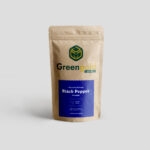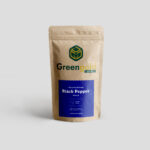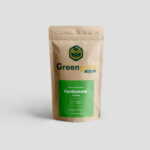Black pepper, often referred to as the “King of Spices,” not only adds flavor to your dishes but can also be a beautiful plant to grow at home. 🌱 If you’re looking to care for your black pepper vine (Piper nigrum) naturally, you’re in the right place! Whether you’re growing it in a container or in your garden, organic care can help your vine thrive and produce high-quality peppercorns. 🌿
In this post, we’ll show you natural methods to keep your black pepper vine healthy and productive, using eco-friendly techniques that promote sustainable gardening. 🌱🌶️
👉 Shop organic gardening supplies and black pepper plants at Greengold Guide!
1. Understanding Black Pepper Vine Care 🌿
Before diving into the care tips, let’s first understand the needs of a black pepper vine:
- Native Habitat: Black pepper is native to the tropical regions of India and Southeast Asia, where it thrives in humid, warm climates with lots of sunlight.
- Growth Habit: It is a climbing vine, which means it needs a support structure like a trellis or stake.
- Soil Preferences: The vine loves loamy, well-draining, and rich soils, making organic matter and natural fertilizers essential for healthy growth.
Now, let’s dive into the natural care methods to grow your black pepper vine successfully.
2. Choosing the Right Spot for Your Pepper Vine 🌞
The first step in caring for your black pepper vine is selecting the right location. Pepper vines need:
- Bright, indirect light: A spot with filtered sunlight or a partially shaded area is ideal. Avoid placing the vine in direct sunlight for long periods, as this can scorch the leaves.
- Temperature: Black pepper thrives in warm temperatures, ideally between 75°F – 85°F (24°C – 29°C). Ensure that the temperature doesn’t drop below 60°F (15°C).
- Humidity: Since black pepper is a tropical plant, it requires high humidity (around 60-80%). If you’re growing it indoors, consider using a humidifier or placing the plant near a humidifying tray.
3. Using Organic Soil and Fertilizers 🌱
To ensure that your black pepper vine grows healthily and produces high-quality peppercorns, it’s important to use organic soil and fertilizers. Here’s how you can maintain the ideal soil conditions:
- Soil: The soil should be rich in organic matter but also well-draining. A mixture of compost and perlite is perfect for improving aeration and drainage. If you’re growing the vine in a container, make sure the pot has drainage holes to prevent waterlogging.
- Compost and Mulch: Add organic compost to the soil regularly. This not only enriches the soil with nutrients but also helps retain moisture. Mulching around the base of the plant helps to retain soil moisture and suppress weeds naturally.
- Natural Fertilizers: Instead of using synthetic fertilizers, opt for organic fertilizers like fish emulsion, worm castings, or seaweed extracts. Apply them in small amounts every 4-6 weeks during the growing season (spring and summer).
4. Watering Naturally 💧
Black pepper vines need consistent moisture, but they also don’t like sitting in waterlogged soil. Here’s how to water your pepper vine naturally:
- Watering Schedule: Water the plant when the top inch of soil feels dry. Ensure that the soil remains moist but not soggy. Avoid overwatering, which can lead to root rot.
- Water Quality: If possible, use rainwater or filtered water, as it is less likely to contain chemicals that can harm the plant. Distilled water is also a good choice for sensitive plants.
- Drainage: Ensure that the container or garden bed has good drainage. If growing in a container, allow excess water to drain away to avoid water buildup.
5. Support the Pepper Vine Naturally 🌱
As a climbing vine, black pepper needs a structure to support its growth. Here’s how to help the vine grow naturally:
- Support Structures: Use a trellis, bamboo poles, or wooden stakes to support the vine. As the vine grows, gently guide the stems around the support structure.
- Natural Twine or Plant Ties: Avoid using plastic ties or synthetic materials. Instead, use soft twine, yarn, or garden twine to tie the vine to the structure. This prevents damage to the vine while providing stability.
- Pruning: Regularly prune the vine to encourage healthy growth. Trim any dead or yellowing leaves, and remove any unwanted side shoots to keep the vine’s shape compact and manageable.
6. Maintaining Humidity Naturally 💧
Black pepper thrives in high humidity, so maintaining the right level of moisture in the air is essential for the plant’s well-being. Here’s how to ensure proper humidity:
- Group Plants Together: If you have other plants that love humidity, consider grouping them together around your black pepper vine. This helps create a micro-environment of higher humidity.
- Humidity Tray: Place a shallow tray of water with stones under the plant. As the water evaporates, it will increase the humidity around the plant. Make sure the water doesn’t touch the soil.
- Misting: Lightly mist the leaves with water if you live in a dry climate. This helps mimic the natural tropical environment of the pepper vine.
7. Natural Pest Control for Black Pepper Vines 🐞
Pests can sometimes be an issue for black pepper vines, but there are plenty of natural methods to keep them at bay:
- Neem Oil: This natural insecticide is effective against aphids, spider mites, and other pests. Mix it with water and spray it on the leaves and stems every few weeks.
- Insecticidal Soap: If you see pests on the plant, try using insecticidal soap made from organic ingredients. You can also make your own by mixing a small amount of dish soap with water and spraying the affected areas.
- Encourage Beneficial Insects: Attract natural predators like ladybugs and lacewings to your garden. These beneficial insects will help control aphids and other harmful pests.
8. Harvesting Black Pepper Naturally 🌶️
After about 3-4 years, your black pepper vine should start producing green peppercorns. Here’s how to harvest them:
- Wait for Ripeness: Peppercorns are harvested when they turn red and begin to mature. You can pick the peppercorns before they ripen fully to preserve their flavor.
- Hand Harvesting: Gently cut the clusters of peppercorns from the vine with sterilized scissors or garden shears. Be careful not to damage the vine during harvesting.
- Drying: To dry the peppercorns, place them in a well-ventilated area away from direct sunlight. Allow them to dry completely until they turn black and harden. This process can take about 2-3 weeks.
9. Final Thoughts: Growing Black Pepper Naturally 🌿
Caring for black pepper vines naturally is a rewarding experience that allows you to grow your own organic pepper in the comfort of your home or garden. By using organic soil, natural fertilizers, and eco-friendly pest control, you can cultivate a healthy and productive vine.
With the right care, patience, and attention, your black pepper vine will thrive and provide you with fresh, homegrown peppercorns for years to come! 🌶️
👉 Shop organic gardening supplies and black pepper plants at Greengold Guide!


